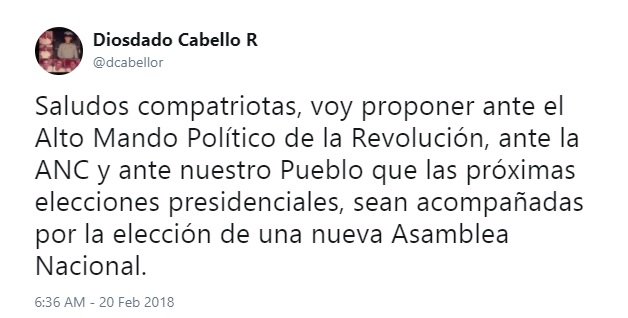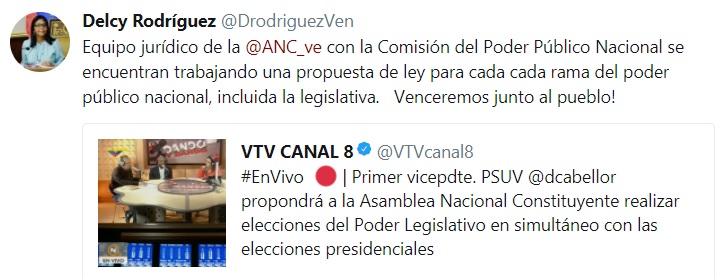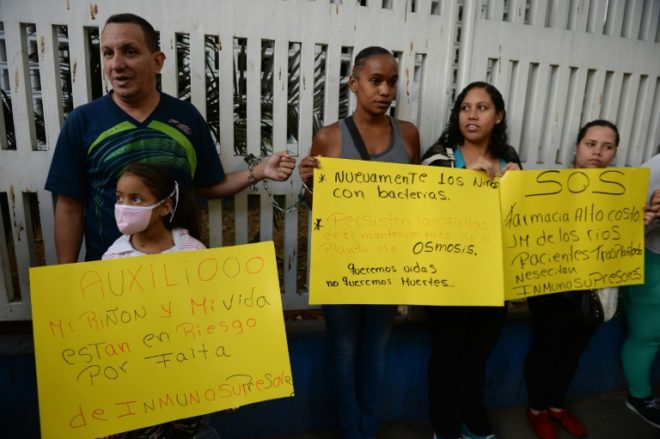Double or Nothing
Your daily briefing for Friday, February 21, 2018. Translated by Javier Liendo.


Diosdado Cabello said yesterday that he’ll propose holding both presidential and parliamentary elections on April 22.
Lawmakers in the National Assembly (AN) were elected for the 2016-2021 period, so the election proposed by Cabello should be held in December 2020, but since Parliament is the only public power not controlled by the Executive, and despite all the efforts made by the government and the Supreme Tribunal to nullify it with the so-called “contempt”, it hasn’t been formally dissolved and is recognized as an originally legitimate power.
Presidential candidates are to register in four days and MUD hasn’t announced yet whether it’ll participate in this new abuse that comes on top of disqualifications of political leaders and party invalidations. The idea is to vote, not to choose; the idea is to break unity and move on.
By the way, Cabello’s idea is also the veiled admission that the ANC was never legal or legitimate and that it is as all-powerful as it is democratic. The ANC didn’t fulfill its purpose, so they’re after the AN.
Guarantees of a self-agreement
Right after Cabello announced his idea, Delcy Rodríguez said that the ANC’s judicial team is working on a bill for each public power.
Later, National Electoral Council chairwoman Tibisay Lucena based her statement on an unacceptable mistake: saying that the document Jorge Rodríguez left signed in Santo Domingo was a cohabitation agreement. And so, the guarantees the government agreed with itself are: an electoral observation mission; equal access to public and private media for the campaign; returning voting stations to their original places; performing all technical audits; choosing table members at random and opening the electoral registry. In other words, the government’s guarantees are inherent qualities of any election. Lucena remarked that Cabello’s proposal was “a hypothetical situation” and didn’t say whether the CNE has the technical capacity to add parliamentary elections to the April 22 event.
Borges to Lucena
Primero Justicia announced that they won’t participate in presidential elections and Julio Borges answered Tibisay Lucena’s main messages:
PHOTO: BORGES’ SHIT
“You lie, there was no agreement in the Dominican Republic,” he wrote in his first message, explaining that the April 22 elections are a fraud. The document signed by Jorge Rodríguez alone doesn’t establish the conditions for free and democratic elections: a viable date; free participation —without political prisoners or disqualifications— conditions for Venezuelans living abroad to be able to vote and professional international observation to monitor the development of the electoral timetable.
Economist Asdrúbal Oliveros, member of the dialogue advisory team, tweeted:
El principal signo de que en República Dominicana o hubo acuerdo es que Tibisay Lucena sigue en el CNE…
— Asdrúbal R. Oliveros (@aroliveros) February 20, 2018
“The main sign that there was no agreement in the Dominican Republic is that Tibisay Lucena is still in the CNE.”
Executioner State
The families of Nephrology patients at the JM de los Ríos Children’s Hospital protested yesterday, demanding supplies for dialysis machines, the reactivation of transplants and guarantees for children’s right to life and health, which includes the supply of immunosuppressant medication, antibiotics, anti-hypertensives and painkillers.
Este es el conmovedor mensaje de infante recluida en el JM de Los Ríos a la espera de trasplante. "He visto morir a niños por falta de medicamentos", dijo/ Vía: @JoanCamargo_ pic.twitter.com/KDCUJgNyxk
— CaraotaDigital (@CaraotaDigital) February 20, 2018
In addition to the humiliation that they suffer along with their children, the relatives also denounced that Health Ministry employees threatened them for protesting, even suggesting the possibility of calling colectivos.
In the National Assembly, lawmaker José Manuel Olivares announced the creation of a Committee to determine the criminal responsibility of government authorities for the crisis of the health sector: “because those responsible for this crisis and for the deaths of thousands of Venezuelans due to lack of supplies and quality medical attention, must be held accountable,” said Olivares.
Almost at the same time, the National Guard took over the facilities of the Venezuelan Institute of Scientific Research (IVIC), whose employees have been protesting for two days.
#20Feb 11:30am GNB toma inmediaciones del IVIC ante segundo día de protesta de trabajadores de este instituto pic.twitter.com/7styWVSXJC
— Daniel Murolo (@dmurolo) February 20, 2018
What else happened in Parliament?
Speaker Omar Barboza said that Cabello’s proposal means “that the government will take the path of illegality,” and claimed that the AN “doesn’t kneel before anyone or the attempts to impose illegitimate solutions.” Regarding Delcy Rodríguez’s announcement about a reform on the laws that regulate public powers, Barboza said that those would be null decisions because they’re issued by an illegitimate body, explaining that the rules imposed by the ANC are applied arbitrarily and ignoring rights.
The Interior Policy Committee reported that they’ll investigate the events that led to the murder of 18 people allegedly at the hands of the Army in Roscio municipality, Bolívar state.
Parliament also approved the “Agreement on official censorship and media shutdowns,” due to the operation of the Alfredo Maneiro Editorial Complex, which has caused the shutdown of 36 printed outlets.
Petro and hunger
The announcements regarding the basis for economic recovery, wich Nicolás was supposed to make last night, were a summary on what he’s managed to grasp about cryptocurrencies in general and the petro in particular; meanwhile, Cenda reported yesterday that the food basket’s price for January was Bs. 12,681,164.77, with an inter-monthly variation of 58.9% (Bs. 4,700,850.75), higher than the one recorded in December 2017. The purchasing power of wages dropped to its lowest level in the last 20 years, since a minimum wage (Bs. 248,510.41) barely pays for 2% of the basket: “For the first time in 60 years, a minimum monthly salary is below the minimum required per day for a family to buy food.”
Nobody’s war
While Turkey attacked the Kurdish enclave of Afrin with planes and artillery, minister Vladimir Padrino López cautioned of an unprecedented imperial attack in Venezuela, so he made a call to defend sovereignty. He did it just before questioning Peruvian authorities for removing Nicolás’ invitation to the Summit of the Americas, and said: “diplomacy has been fading, the politics of war have been taking its place.” His statements on any subject prove the point. Padrino López claimed that based on Armed Forces data, there are no records that the ELN guerrilla man who died in an explosion had been a member of the National Guard and demanded Colombian authorities to open an investigation on the case, asking his counterpart, Luis Carlos Villegas, for a meeting to talk about security at the border. He restated that on Nicolás’ orders, there will be military drills this whole week.
Abroad
- OAS chief Luis Almagro asked the international community to impose broader and stronger sanctions against the Venezuelan government, accusing them of being a threat for international peace and security. He added that the most terrible sanction for Venezuelans “would be six years of repression and dictatorship, of hunger, of disease and of human rights abuses,” referring to the continuity of Nicolás’ government.
- On the opposite fence, Ecuador’s Vice President María Alejandra Vicuña said that Venezuela must be present in the Summit of the Americas, adding that they don’t share meddling stances and they’ll always reject “any form of intervention in the internal matters of nations.” Sadly, they don’t express the same vehement rejection towards authoritarianism and the vilification of the dignity of Venezuelans.
- Colombian Foreign Minister María Ángela Holguín will visit Brasilia today and her agenda includes an analysis of the situation created by the massive exodus of Venezuelans.
- Ah! The UN clarified that they haven’t received a formal request from the Venezuelan government regarding electoral assistance. Assistance, my dears, not observation.
- A White House spokeswoman told EFE that president Trump will meet with Nicolás when democracy had been restored, when the Constitution is respected, when free elections are held, political prisoners are released and oppression against the people ends. Ouch!
…
While Luisa Ortega Díaz reported on Twitter that she’ll send information to the AN’s Comptrollership Committee concerning acts of corruption in CLAP, exiled justice Gonzalo Álvarez Domínguez explained to Deutsche Welle that the TSJ in exile doesn’t have the authority to process Ortega Díaz’s petition requesting Interpol to issue an alert to arrest Nicolás because: “We are not exercising our posts (…) the rather symbolic idea was to remain as a united body of opinion to convey ideas (…) ideas, not decisions.”
"No estamos en ejercicio del cargo (…) la idea era más bien simbólica, de permanecer como un órgano de opinión unido para transmitir ideas (…) ideas, no decisiones", dice el magistrado en el exilio Gonzalo Alvárez pic.twitter.com/s0YyGFPnSv
— Naky Soto (@Naky) February 20, 2018
Caracas Chronicles is 100% reader-supported.
We’ve been able to hang on for 21 years in one of the craziest media landscapes in the world. We’ve seen different media outlets in Venezuela (and abroad) closing shop, something we’re looking to avoid at all costs. Your collaboration goes a long way in helping us weather the storm.
Donate






